BMW iX1 vs VW ID. Buzz Cargo – Which one offers the better deal?
Two cars, one duel: BMW iX1 meets VW ID. Buzz Cargo.
Which one wins in performance, efficiency and value for money? Find out now!
Here’s where it gets real: The technical differences in detail
Costs and Efficiency: When it comes to price and running costs, the biggest differences usually appear. This is often where you see which car fits your budget better in the long run.
BMW iX1 has a hardly any advantage in terms of price – it starts at 41800 £, while the VW ID. Buzz Cargo costs 43600 £. That’s a price difference of around 1736 £.
In terms of energy consumption, the advantage goes to the BMW iX1: with 15.80 kWh per 100 km, it’s noticeably more efficient than the VW ID. Buzz Cargo with 19.20 kWh. That’s a difference of about 3.40 kWh.
As for range, the BMW iX1 performs slight better – achieving up to 463 km, about 8 km more than the VW ID. Buzz Cargo.
Engine and Performance: Power, torque and acceleration are the classic benchmarks for car enthusiasts – and here, some clear differences start to show.
When it comes to engine power, the VW ID. Buzz Cargo has a slight edge – offering 340 HP compared to 313 HP. That’s roughly 27 HP more horsepower.
In terms of top speed, the BMW iX1 performs a touch better – reaching 180 km/h, while the VW ID. Buzz Cargo tops out at 160 km/h. The difference is around 20 km/h.
There’s also a difference in torque: the VW ID. Buzz Cargo pulls noticeably stronger with 679 Nm compared to 494 Nm. That’s about 185 Nm difference.
Space and Everyday Use: Beyond pure performance, interior space and usability matter most in daily life. This is where you see which car is more practical and versatile.
Seats: BMW iX1 offers clearly more seating capacity – 5 vs 3.
In curb weight, the BMW iX1 is a bit lighter – 1940 kg compared to 2264 kg. The difference is around 324 kg.
In maximum load capacity, the VW ID. Buzz Cargo performs strongly better – up to 3900 L, which is about 2405 L more than the BMW iX1.
When it comes to payload, VW ID. Buzz Cargo distinctly takes the win – 753 kg compared to 495 kg. That’s a difference of about 258 kg.
Our conclusion: The VW ID. Buzz Cargo proves to be leaves its rival little chance and thus becomes our DriveDuel Champion!
Overall, VW ID. Buzz Cargo is the better all-rounder in this comparison.
BMW iX1
The BMW iX1 stands out as a versatile addition to the electric vehicle market, seamlessly combining compact dimensions with advanced electric technology. Its sophisticated design elements and premium interiors ensure a luxurious driving experience, while the vehicle's performance focuses on delivering both efficiency and agility. With enhanced connectivity features and an emphasis on sustainability, this model represents a significant step forward in BMW's commitment to a greener future.
details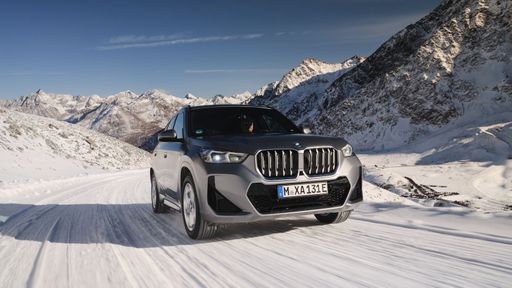 @ press.bmwgroup.com
@ press.bmwgroup.com
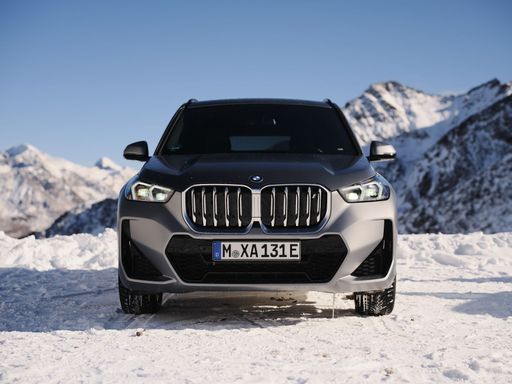 @ press.bmwgroup.com
@ press.bmwgroup.com
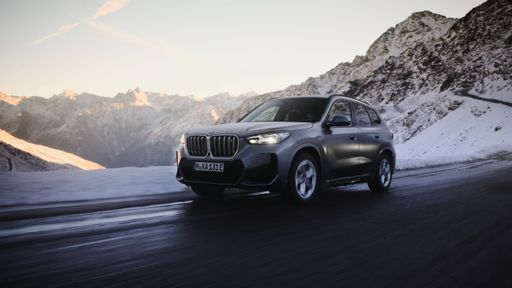 @ press.bmwgroup.com
@ press.bmwgroup.com
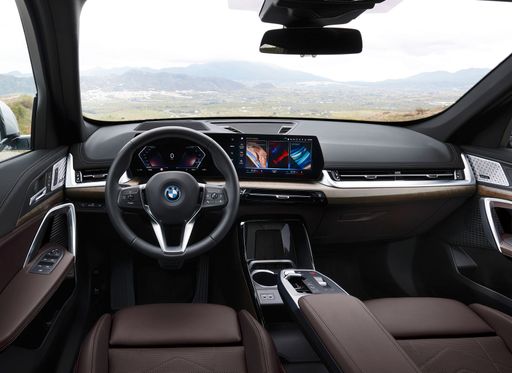 @ press.bmwgroup.com
@ press.bmwgroup.com
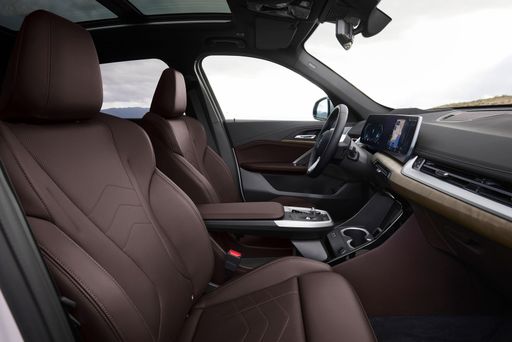 @ press.bmwgroup.com
@ press.bmwgroup.com
VW ID. Buzz Cargo
The VW ID. Buzz Transporter represents a bold leap into the future with its innovative electric design and retro-inspired aesthetic. Combining practicality with modern technology, it offers a spacious interior and advanced connectivity features ideal for both urban and long-distance journeys. This vehicle stands as a testament to Volkswagen's commitment to sustainability and forward-thinking mobility solutions.
details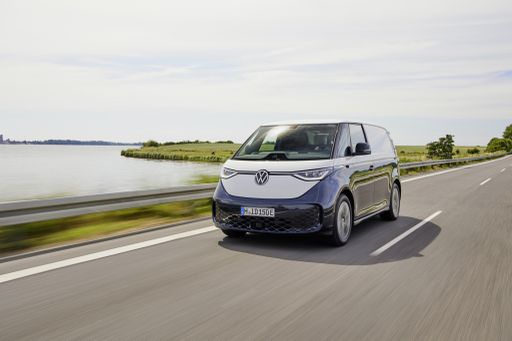 @ volkswagen-newsroom.com
@ volkswagen-newsroom.com
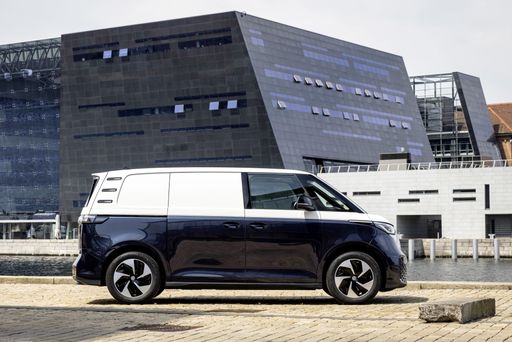 @ volkswagen-newsroom.com
@ volkswagen-newsroom.com
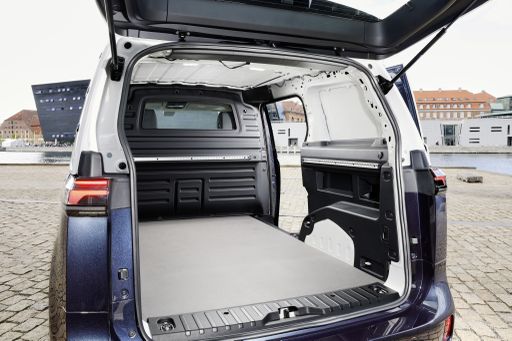 @ volkswagen-newsroom.com
@ volkswagen-newsroom.com

|

|
|
|
|
Costs and Consumption |
|
|---|---|
|
Price
41800 - 54600 £
|
Price
43600 - 51400 £
|
|
Consumption L/100km
-
|
Consumption L/100km
-
|
|
Consumption kWh/100km
15.8 - 17.1 kWh
|
Consumption kWh/100km
19.2 - 20.3 kWh
|
|
Electric Range
436 - 463 km
|
Electric Range
330 - 455 km
|
|
Battery Capacity
64.80 kWh
|
Battery Capacity
59 - 79 kWh
|
|
co2
0 g/km
|
co2
0 g/km
|
|
Fuel tank capacity
-
|
Fuel tank capacity
-
|
Dimensions and Body |
|
|---|---|
|
Body Type
SUV
|
Body Type
Cargo Van
|
|
Seats
5
|
Seats
3
|
|
Doors
5
|
Doors
4
|
|
Curb weight
1940 - 2085 kg
|
Curb weight
2264 - 2510 kg
|
|
Trunk capacity
490 L
|
Trunk capacity
-
|
|
Length
4500 mm
|
Length
4712 mm
|
|
Width
1845 mm
|
Width
1985 mm
|
|
Height
1616 mm
|
Height
1932 mm
|
|
Max trunk capacity
1495 L
|
Max trunk capacity
3900 L
|
|
Payload
495 kg
|
Payload
640 - 753 kg
|
Engine and Performance |
|
|---|---|
|
Engine Type
Electric
|
Engine Type
Electric
|
|
Transmission
Automatic
|
Transmission
Automatic
|
|
Transmission Detail
Reduction Gearbox
|
Transmission Detail
-
|
|
Drive Type
Front-Wheel Drive, All-Wheel Drive
|
Drive Type
Rear-Wheel Drive, All-Wheel Drive
|
|
Power HP
204 - 313 HP
|
Power HP
170 - 340 HP
|
|
Acceleration 0-100km/h
5.6 - 8.6 s
|
Acceleration 0-100km/h
-
|
|
Max Speed
170 - 180 km/h
|
Max Speed
145 - 160 km/h
|
|
Torque
250 - 494 Nm
|
Torque
310 - 679 Nm
|
|
Number of Cylinders
-
|
Number of Cylinders
-
|
|
Power kW
150 - 230 kW
|
Power kW
125 - 250 kW
|
|
Engine capacity
-
|
Engine capacity
-
|
General |
|
|---|---|
|
Model Year
2022 - 2023
|
Model Year
2024
|
|
CO2 Efficiency Class
A
|
CO2 Efficiency Class
A
|
|
Brand
BMW
|
Brand
VW
|
Is the BMW iX1 offered with different drivetrains?
The BMW iX1 is available as Front-Wheel Drive or All-Wheel Drive.
The prices and data displayed are estimates based on German list prices and may vary by country. This information is not legally binding.
